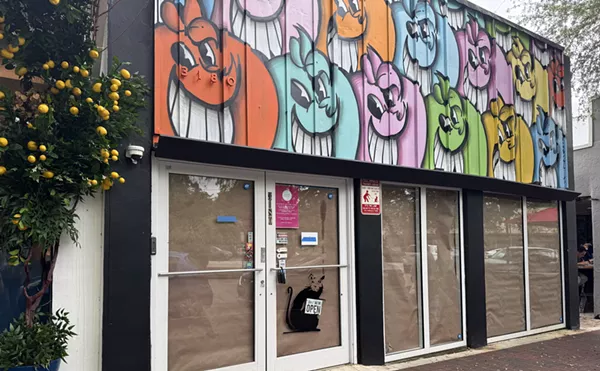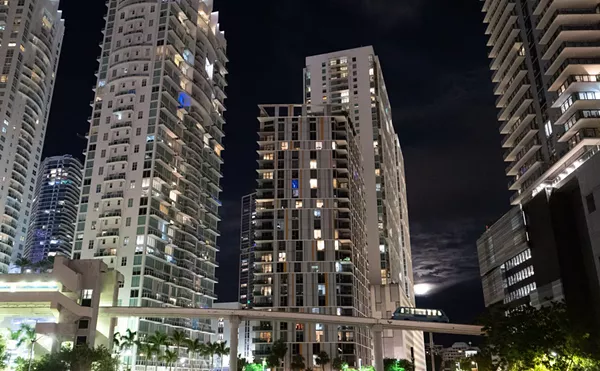At the two slums where it all happened, you pay the rent.
Dilip Barot, a politically connected, Indian-born businessman who lives in a $13 million Palm Beach County estate, is the registered agent for — and maintains a financial interest in — the firm that owns these hell holes near NW 135th Street. Creative Choice Homes II collects tens of thousands of federal dollars a month to house the mostly poor and disabled residents. Despite all of that money, Shenequa Smith and her five children don't sleep much.
"In a week, I hear shooting outside my window three times, and I get up and roll under my bed," she says, eyeing a coffee-can-size hole through her apartment's roof. "My kids don't ever go outside."
The Alexandria Gardens apartments are located amid the twisted metal of auto junkyards in Opa-locka, a tiny, drug-ridden community that is Miami-Dade County's murder capital. It has seen nine homicides this year. Population is but 15,000.
The pair of properties, just south of Opa-locka Boulevard near NW 32nd Avenue, are the epicenter. Since March, there have been three killings. Dealers have wounded one police officer, shot at another, and struck a third with a getaway car.
Though the daily press has barely noticed, U.S. Housing and Urban Development officials, Miami-Dade commissioners, state prosecutors, and cops have quietly huddled to strategize during the past few days. But so far, nothing. "I'm going to grind [Barot and the owners] into the ground." says Opa-locka Police Chief James Wright. "When I see the conditions there, it brings tears to my eyes,"
Barot, a Democratic party bigwig who immigrated to the United States in 1983 and has been lauded by Forbes magazine, declined to comment. The company's attorney, Alex Heckler, said the firm has invested $2 million in the properties so far and recently won grants for $2 million more. "Creative Choice is proactively trying to get funds to fix the problems," he says. Just last month 40 units were renovated: "They are brand-new inside."
To be fair, no one has advocated much for change at the Gardens. Built 35 years ago, they include a combined 362 apartments. Creative Choice Homes Limited II bought them in 1992 for $538,000.
Over the years, the properties — which are subsidized by a federal program for the poor called Section 8 — have degenerated. But they have increased in value. They are now worth a combined $7 million, quite a profit. And by 2008, a requirement that they be used for affordable housing will expire.
Shenequa Smith has lived at 13122 Port Said Rd. for most of those years. She is no angel. The pretty 35-year-old, who was dressed in a black T-shirt and gold sandals when we met recently, has been arrested four times since 1992 for crimes like petty larceny and not returning a rental car, but never convicted. In 2003 she was accused of cheating on welfare. That charge is pending.
Smith sends her kids — ages ten to eighteen — to private school, Spirit of Christ Academy. Their small bedrooms in the two-story apartment include books and trophies that attest to their achievements.
Conditions have always been intolerable at the Gardens, she says. Then Hurricane Wilma blew through. Though Smith received emergency aid and briefly relocated, she returned five months ago. Two of her boys, ages fourteen and eighteen, sleep next to a blown-out window. They've become accustomed to the mosquitoes and heat. It's more difficult to abide the rain that spills through the year-old hole in the roof. Gnats fill the cabinet beneath her kitchen sink. A pipe is broken, so she washes dishes in an aluminum tub. "It's not right," she says. "It's not right for the kids."
One day last week at 11:00 a.m., Smith took me across the compound, past a discarded water heater, Shaquille O'Neal-high grass, and a drug deal (two drivers exchanged a package and money) to the spot where a crook named James Williams allegedly killed 23-year-old Leroy Brown in early July. Police say Brown declined to pay up on a five-dollar craps bet. In his memory, dozens of plush teddy bears — faded blue, green, and yellow with orange ears — were surrounded by bottles of Grey Goose vodka and Bacardi Limón.
Nearby is the spot where 25-year-old Ronal Delie was gunned down a week later when he went to buy drugs. There's no memorial. And no one has been arrested.
Finally, after visiting a gutted apartment that reeked of urine and stale beer ("How would you like your teenage daughter dragged in there?" Smith asks), we stopped by Shatira Johnson's place. This past April, Johnson's three-year-old daughter, Sylena, fell through a railing that was missing several rungs and landed on her head. "I was scared, crying, and panicking," Johnson recalls. Sylena lost consciousness on the way to the hospital. "The ambulance man said she was very lucky."
Johnson says she had complained about the railing for years but nothing was done. An insurance company paid her $75,000, she says. "This place is horrible." Johnson plans to move out soon.
(Heckler didn't know about the accident. The complex has been damaged by hurricanes, and owners await insurance money, he contends. Furthermore, Barot is no longer an owner but retains financial interest, Heckler says. He was unable to name the new owners.)
Indeed city inspectors have discovered problems. But they haven't been very aggressive. Records show only two code violations since July at the Port Said Road property — for "hazardous conditions" and "minimal housing issues." There was no written explanation, but both problems had allegedly been corrected as of November 3, the records show.
The same holds true for another, smaller property belonging to the company, at 13436 Aswan Rd. There have been more violations — ten since May for things like nonworking fire alarms, garbage, and free-roaming chickens — but all are noted as "corrected." There was no mention of the numerous holes in walls, broken windows, or open sewage I saw.
The Aswan property has also been deadly. A drug dealer fired at cops there in March before he was arrested, and on October 13, 25-year-old Gregory Fraser was killed in a shoot-out with police. One Miami-Dade Police officer was wounded twice — with 39mm rounds from an AK-47 — in that incident. An Opa-locka cop was hit by the getaway car.
Officers "felt they were totally outgunned," says county Commissioner Barbara Jordan. "The public had total disregard for police."
Adds Chef Wright: "This must never happen again."
Armando Fana, director of HUD's Miami field office, recently toured the property. He suggested repairs would cost $10 million and that residents would have to be relocated. "I have never seen a property this bad," he comments.
But improving the Gardens might not be so easy. Political infighting in Opa-locka is epidemic. City Commissioner Timothy Holmes, who was re-elected last week — and whose twelve-foot-high image appears on a campaign sign in front of the Port Said property — defends the city's approach to the property. "We have a good code enforcement department," he says, "but we need to be more aggressive." And Holmes is at war with Wright. "We have a chief of police who just doesn't give a damn," he says. "Chief Wright is the problem."
Responds Wright: "Holmes has run roughshod over the city for years."
Rev. Alfred Clark, who hopes to dedicate a youth outreach center at the Port Said property in December, says something must be done. "There are 900 kids who live in this place, and it's deplorable. They can't move. When you are poor, you have no choice."
Staff Writer Calvin Godfrey contributed to this report.












